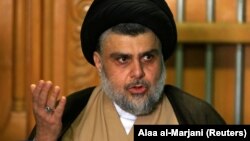Shi'ite leaders in Iraq form unexpected, pro-Iran political alliance
| Publisher | Radio Free Europe/Radio Liberty |
| Publication Date | 13 June 2018 |
| Cite as | Radio Free Europe/Radio Liberty, Shi'ite leaders in Iraq form unexpected, pro-Iran political alliance, 13 June 2018, available at: https://www.refworld.org/docid/5bc04f09a.html [accessed 19 May 2023] |
| Disclaimer | This is not a UNHCR publication. UNHCR is not responsible for, nor does it necessarily endorse, its content. Any views expressed are solely those of the author or publisher and do not necessarily reflect those of UNHCR, the United Nations or its Member States. |
June 13, 2018 05:03 GMT
By RFE/RL
 Iraqi Shi'ite cleric Muqtada al-Sadr
Iraqi Shi'ite cleric Muqtada al-Sadr
Powerful Shi'ite cleric Muqtada al-Sadr has announced an unexpected political alliance with pro-Iranian militia chief Hadi al-Amiri in a bid to lead Iraq over the next four years.
The two blocs won first and second place in the country's May 12 parliamentary election. By forming a coalition with Amiri on June 12, Sadr moves a step closer to forming a coalition with enough seats to hold a majority in the 329-seat parliament.
The two Shi'ite figures said they would keep the door open for other winning blocs to join them in forming a new government.
The move by Sadr, who is staunchly opposed to Iranian involvement in the country, was a surprise as he had previously suggested he would not work with Amiri and his band of pro-Iranian former fighters.
Sadr, a former militia leader who led two uprisings against U.S. occupying forces which left Iraq in 2011, has called for his country to be more independent from both Iran and the United States.
Amiri, leader of the Fatih alliance and a fluent Farsi speaker, is Iran's closest ally in Iraq, having spent two years in exile there during the era of Saddam Hussein.
At a joint press conference with Amiri in the city of Najaf, regarded as a holy city among Shi'a, Sadr said they would form "a true alliance to accelerate the formation of a national government away from any dogmatism."
"Our meeting was a very positive one. We met to end the suffering of this nation and of the people. Our new alliance is a nationalist one," Sadr said.
Confusion has gripped Iraq since Sadr's electoral alliance with communists won the vote. Last week, Iraq's parliament ordered a manual vote recount and sacked the commission that oversaw the polls amid mounting claims of electoral fraud.
"This is a call to all those who care about national interests . . . We will set up committees to discuss with all ways to accelerate the drafting of a government program," said Amiri, whose militia fighters played a key role last year in the defeat of the Islamic State extremist group.
The May election saw a record number of abstentions as many Iraqis snubbed the corruption-tainted elite that has dominated the country since the 2003 U.S. invasion that toppled Hussein.
Many of Iraq's longtime political figures were pushed out of their seats by new faces in the elections.
With reporting by AFP and Reuters
Link to original story on RFE/RL website
